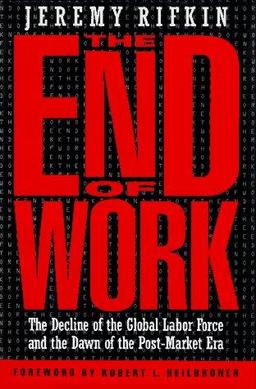Friday, March 08, 2013
Myth#3: There Are No Solutions for Unemployment
I am reading a book that I read the first edition of about 1980. The book is entitled "The End of Work". It contends that computer technology, robotics, and technology in general are reducing the need for labor. For example it states that steel production in the last twenty years rose from 75 million to 102 million tons while employment in the steel industry fell from 289,0000 to 74,000. The book is filled with such examples from all over the world with some noted exceptions (Africa, parts of South America, etc.) Even China is shedding jobs even as it creates new ones.
Of course, the real unemployment rate in the U.S. is much worse than the offical 8% or so. We do not include people that have stopped looking for work, or people that have never been on the employment roles like high school dropouts that sell drugs or do whatever they can to get by. Neither do they include the 2% of our population that is in prison or the large amount of people that are working but not producing much in government or miliary jobs. And finally, it does not include perhaps 10% or so of our population that is under-employed doing much less than they are capable of doing. Lose your job and if you find a new job it is probably a lower paying job requiring less skills than before.
It is estimated, per Jeremy Rifkin the author of this book that by 2050 only 5% of the adult work force will be need to run all of industry, farms, manufactuting, etc. I visited a wall board plant last year that had 27 acres of a factory under roof producing wall board at a rate of many feet per second. The plant was huge and no one was around. Mountains of wall board were being produced and stacked by machines. A lone fork lift operator loaded pallets onto a truck sitting at the dock. A factory full of machines making wall board. A total of 18 people worked in the plant including secretaries and this was for all three shifts combined - including the boss. The few workers sat watching computer screens. I saw one person get up to make an adjustment on a machine when the computer warned it was slightly out of alignment. It really is happening, jobs are vanishing.
So how is it that we are doing as good as we are doing. Credit. The housing bubble and the credit pumped into our society kept a lot of people employed. It is estimated that the average American lived on 120% of his salary over the last decade. The government spends about 142% of the revenues / taxes that they bring in. They are crying loudly because they have via the sequester dropped down to 136%.
Things are not going to magically fix themselves. We need some short and long time changes to the game book. One simple idea for today, more in later posts.
Job Sharing
France about a decade ago reduced the work week to 35 hours, most of Europe is down to 37 hours or so. Of course, our industry would cry how impossible it would be to reduce the work week without destroying productivity. Surprisingly, two countries that beat American productivity are France and Belgium who have 35 hour work weeks. However, they have the same spending disease that we have so they turn out to be in worse shape than us.
Remember in the elections how we (Obama and Romney) were going to reduce corporate income taxes to improve American competitiveness -- so we at least hold on to more of our jobs. So much for campaign talk.
Large companies are sitting on trillions of dollars they are not investing because their plants are running under capacity because their markets are not growing -- because all the workers /consumers are sitting on the couch at home looking for jobs. (Example, Apple has $400 billion in the bank.)
So, why couldn't we give cuts in the corporate tax rate to those companies that reduce their work week - a sliding scale. One would assume at some point that to maintain productivity they will hire workers to replace the lost hours from shorter work weeks.
Although this is not an international fix, and lack of jobs is an international problem, we can create jobs in America at the expense of the rest of the world by simply lowering our corporate tax rate and attracting the jobs that are created to American instead of Europe, or even China. America is still a good place to find skilled and dedicated workers. Few companies however are willing to pay our corporate taxes, 35% and often state taxes, for example in Maryland, of 35% also. Pay 70% corporate tax or go to Hong Kong or Ireland, etc. and pay 10%. Duhhh, what should we do.
Subscribe to:
Post Comments (Atom)
About Me
Links
Blog Archive
-
▼
2013
(28)
-
▼
March
(8)
- Myth #127 Republicans Can Keep Their Old Beliefs ...
- Myth #12 It is America's Duty to Be The Unpaid Pol...
- Myth #147 Obamacare will be repealed.
- Myth#27: Capitalism Is Good For Workers
- Myth#63: We Are Our Brother's Keeper?
- Myth#3: There Are No Solutions for Unemployment
- Myth#1 America is the Greatest
- Myth #96 We can spend our way out of recession wi...
-
▼
March
(8)




No comments:
Post a Comment